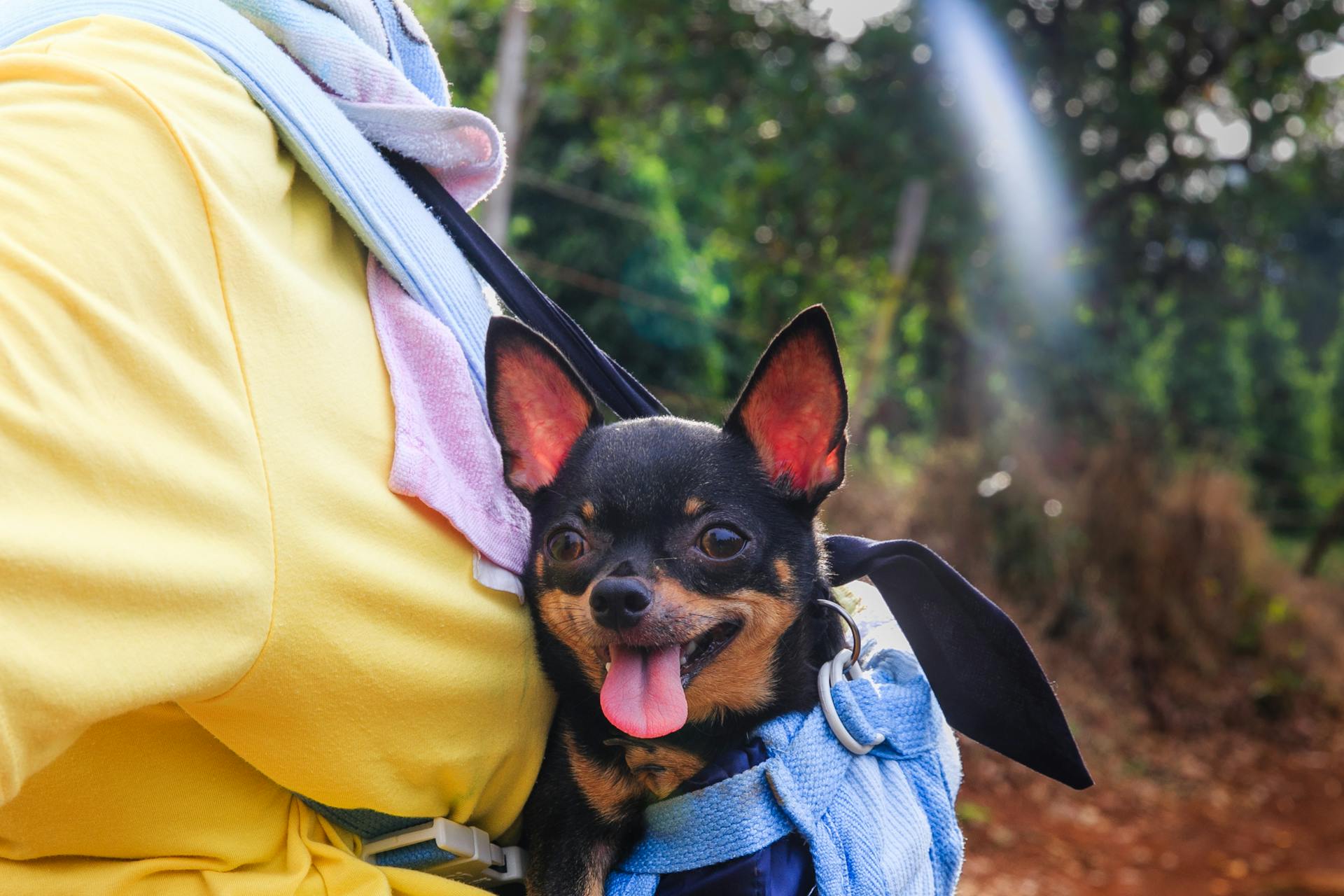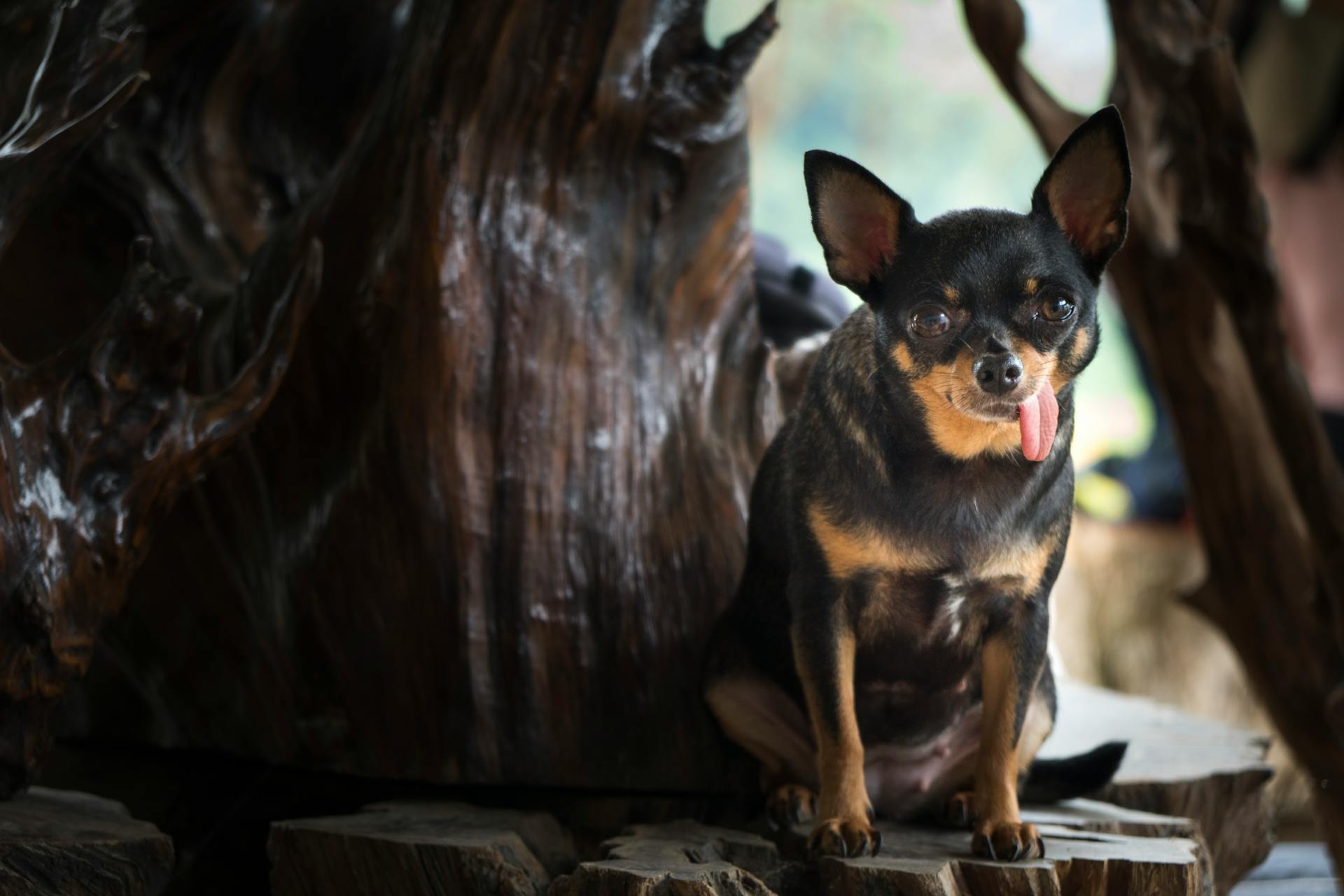
Feeding your Chihuahua the right foods is crucial for their health and happiness, but it's just as important to know what not to feed them.
Chocolate is a big no-no for Chihuahuas, as it contains a toxic substance called theobromine that can cause serious health issues.
Onions and garlic are also on the list of foods to avoid, as they belong to the Allium family and can damage a Chihuahua's red blood cells.
Some human foods like grapes and raisins are toxic to Chihuahuas and can cause kidney failure, so it's best to keep them out of reach.
Bones, especially cooked bones, can splinter and cause internal injuries, so it's best to stick to dog-safe alternatives.
Macadamia nuts are another food to avoid, as they can cause weakness, depression, and tremors in Chihuahuas.
Expand your knowledge: Common Health Problems in Chihuahuas
Foods to Avoid
As a Chihuahua owner, it's essential to know what human foods are toxic to your furry friend. Many household foods are off-limits for Chihuahuas, including those containing alcohol, avocado, macadamia nuts, grapes and raisins, Xylitol, and chocolate.
Spicy food is another no-go for Chihuahuas, as it can cause vomiting, stomach ulcers, or diarrhea, which can be painful for both your dog and your wallet.
Salted foods like popcorn and pretzels can be hazardous if fed to Chihuahuas, as they can lead to sodium ion poisoning, excessive thirst or urination, vomiting, diarrhea, high body temperature, and seizures.
Sugary foods, such as those high in sugar content, can cause obesity, dental health issues, and diabetes in Chihuahuas.
Here are some specific foods to avoid:
- Alcohol
- Avocado
- Macadamia nuts
- Grapes and raisins
- Xylitol
- Chocolate
- Spicy food
- Salty foods (popcorn, pretzels, bacon)
- Sugary foods
- Uncooked yeast dough
- Seeds and pits from fruit
- Raw potato
- Cooked bones
- Apple cores
- Caffeine
- Human medicine
Remember, always stick to a diet approved by your vet, or research healthy foods that you can share with your Chihuahua.
Meat and Dairy
Chihuahuas are prone to kidney disease, and feeding them high-protein foods like meat and dairy can exacerbate the issue.
Some meats, such as bacon and ham, are also high in fat and sodium, which can lead to pancreatitis in Chihuahuas.
Limiting meat and dairy intake can help prevent these health problems.
Milk and Dairy
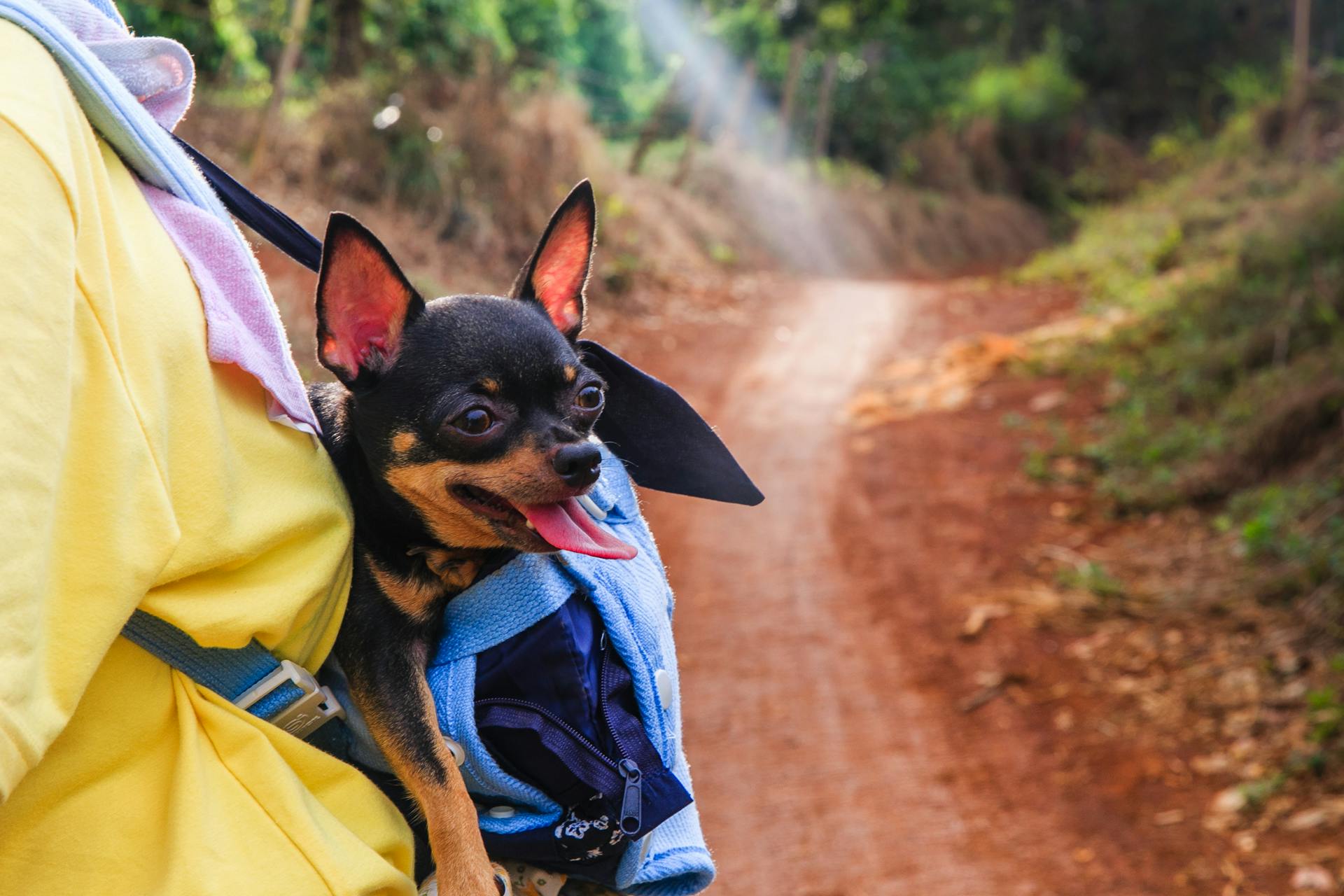
Milk and dairy products can be a tricky business for dogs. Some dogs can handle milk and dairy just fine, but others may experience diarrhea and gas due to lactose intolerance or allergies.
Ice cream is a definite no-no for dogs, thanks to its high sugar, fat, and lactose content. It's better to freeze healthy fruits for your pup instead.
Cheese is okay in small quantities, but choose lower-fat options as treats. High-fat cheese is best avoided.
You might like: Fat Chihuahuas
Bacon and Fatty Meats
High-fat foods like bacon, ham, or meat trimmings can cause pancreatitis in dogs.
Avoid giving your dog fatty meat, as it can also lead to an upset stomach and in extreme cases, bloat, which can be fatal.
Dogs can't have bacon, so save it for yourself and stick to leaner choices for your dog.
High-fat foods can cause dogs to drink too much water, leading to bloat.
Fatty cuts of meat, such as ham and chicken skin, should be thrown out rather than fed to pets as a treat.
Don't feed your dog turkey bones, as they can cause severe indigestion or vomiting.
Raw Meat and Fish
Raw meat and fish can be a subject of controversy, with some vets believing it has health benefits for dogs, such as healthier skin and coats, cleaner teeth, and easier digestion.
Many vets still discourage feeding raw meat to dogs due to the risk of salmonella and E. coli infections, which can happen even to healthy dogs.
Raw eggs have enzymes that can cause skin conditions in dogs, and raw fish can hide parasites that cause fatal diseases.
Freezing and proper preparation can reduce the risks associated with a raw diet, but you need to learn how to properly handle raw food before feeding it to your dog.
It's essential to understand that just buying raw meat at the grocery store and tossing it into your dog's bowl is not safe, and sneaking unprepared meat off the counter or out of the garbage is also a no-go.
Confections
Chocolate is a major no-no for Chihuahuas, as it contains theobromine, a lethal component that can cause hyperactivity, vomiting, diarrhea, pancreatitis, abnormal heart rhythm, and seizures.
Darker chocolate is particularly problematic, as it contains more theobromine than lighter chocolate. Any amount of chocolate can be toxic, so it's best to keep it out of reach.
Some sugar-free chocolate might also contain xylitol, which is toxic to dogs. If you suspect your Chihuahua has ingested chocolate, call your vet immediately.
Candy, gum, peanut butter, and baked goods can also be hazardous, thanks to an ingredient called xylitol. It can cause an insulin surge, leading to lethargy, vomiting, loss of coordination, seizures, and eventually death.
Be sure to check the ingredients list before sharing these treats with your Chihuahua, as some may be xylitol-free. But even if they are, it's still best to keep them out of reach.
Sugary food is another no-go for Chihuahuas, as it can lead to obesity, dental health issues, and diabetes.
Discover more: What Food Is Best for Chihuahuas
Spices and Additives
Keep spicy food away from your Chihuahua, as it can cause vomiting, stomach ulcers, or diarrhea, which can be painful for both your dog and your wallet.
Avoid giving your Chihuahua hot, spicy food, as it can be detrimental to their health.
Take a look at this: El Paso Chihuahuas Food
Spicy Food
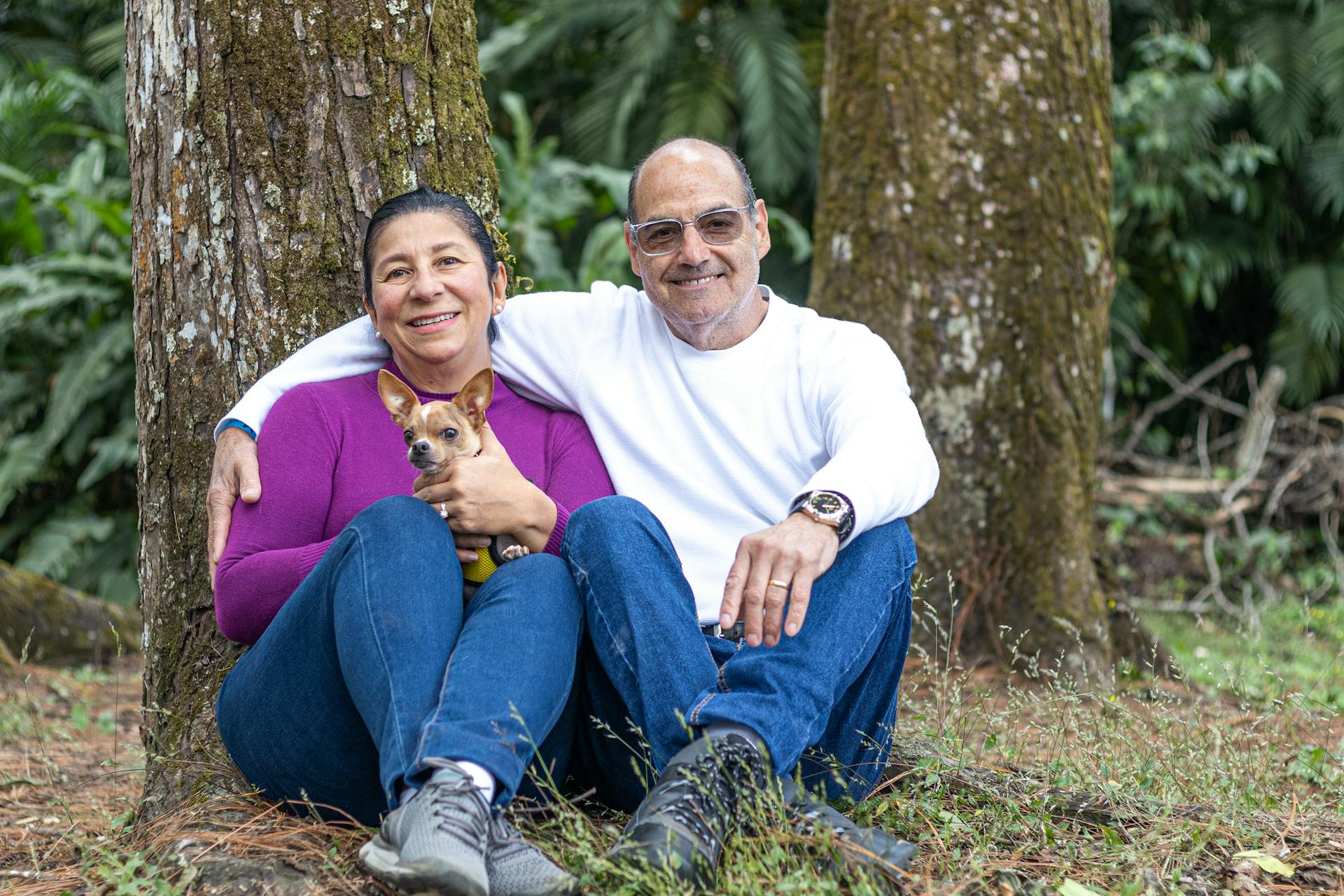
Spicy food can be a real problem for pets, as it can cause vomiting, stomach ulcers, or diarrhea.
Hot, spicy food can be especially painful for dogs, and it's not just their tummies that will be upset - your wallet might take a hit too, as you'll likely be paying for vet visits and medication.
Spicy food can cause stomach ulcers in dogs, which can lead to long-term health issues if left untreated.
It's best to keep your pup away from spicy food altogether, to avoid any potential health problems.
Garlic and Onions
Garlic and onions are a toxic duo for dogs, capable of destroying red blood cells and leading to anemia in high quantities.
They might not cause harm in small doses, but regular small doses can still lead to poisoning.
Symptoms of garlic and onion poisoning in dogs include weakness, vomiting, breathlessness, and a loss of interest in food.
It's essential to keep garlic and onions out of reach of your furry friends to avoid any potential harm.
Intriguing read: Why Are Chihuahuas so Small
Salty Foods
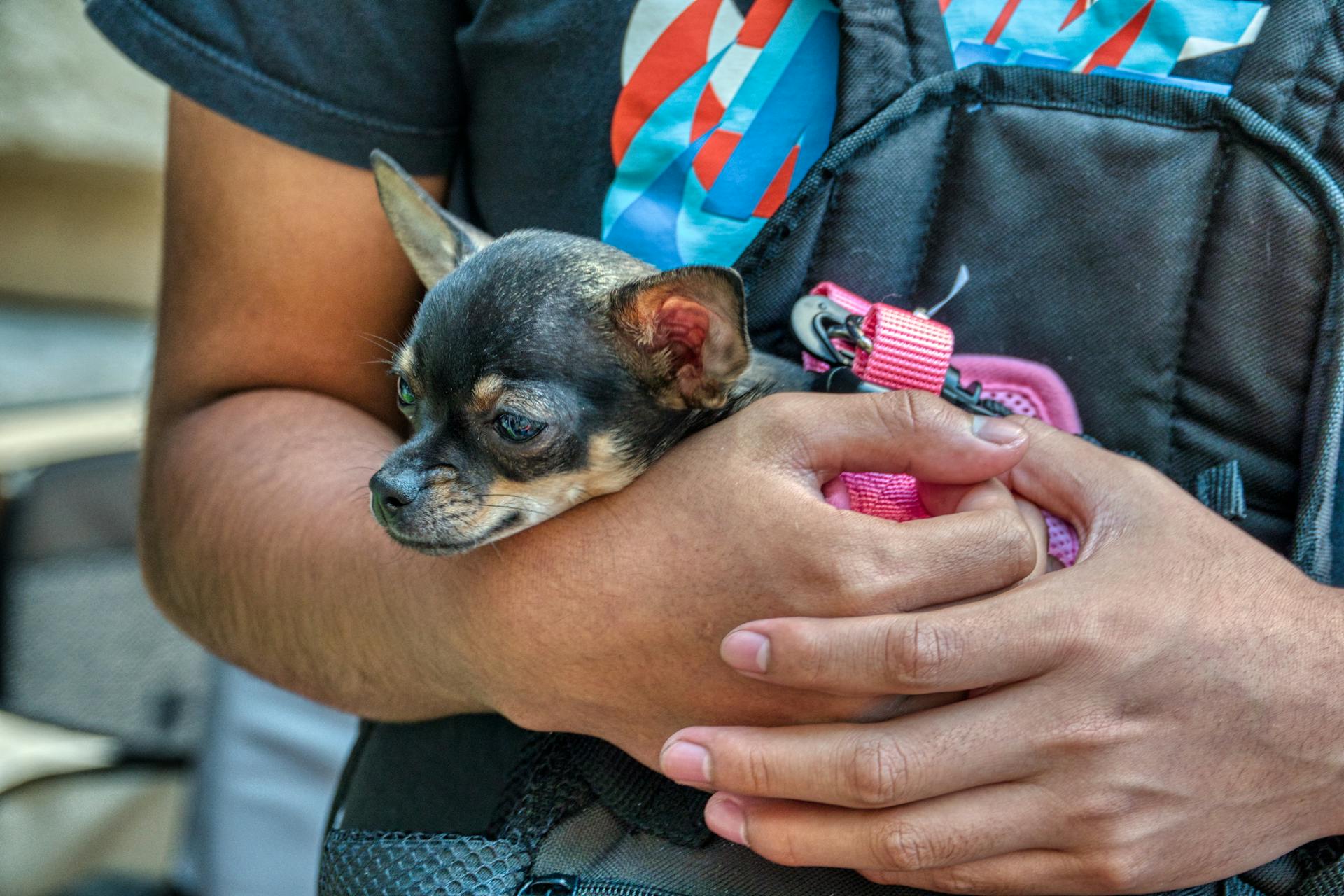
Salty foods can be a problem for dogs, especially if they're high in sodium. Salt can cause sodium ion poisoning, leading to symptoms like vomiting, diarrhea, high body temperature, and seizures.
Bacon, for example, is a salty food that can lead to bloat in dogs. This is in addition to the potential for sodium ion poisoning.
Popcorn and pretzels can also be problematic if they're salted. Salt can cause excessive thirst or urination in dogs, which can be uncomfortable and even lead to health issues.
Salt can be fatal to dogs if they ingest too much, so it's essential to keep it to a minimum in the foods you share with your pup.
Yeast & Dough
Raw dough can expand in your dog's stomach, causing severe pain and potentially life-threatening torsion or rupture of the stomach.
The yeast and sugar in raw dough can ferment, leading to alcohol toxicity, which can be fatal and requires immediate medical intervention.
Dogs should not be given yeast or raw dough to avoid these risks.
Nuts and Peanut Butter
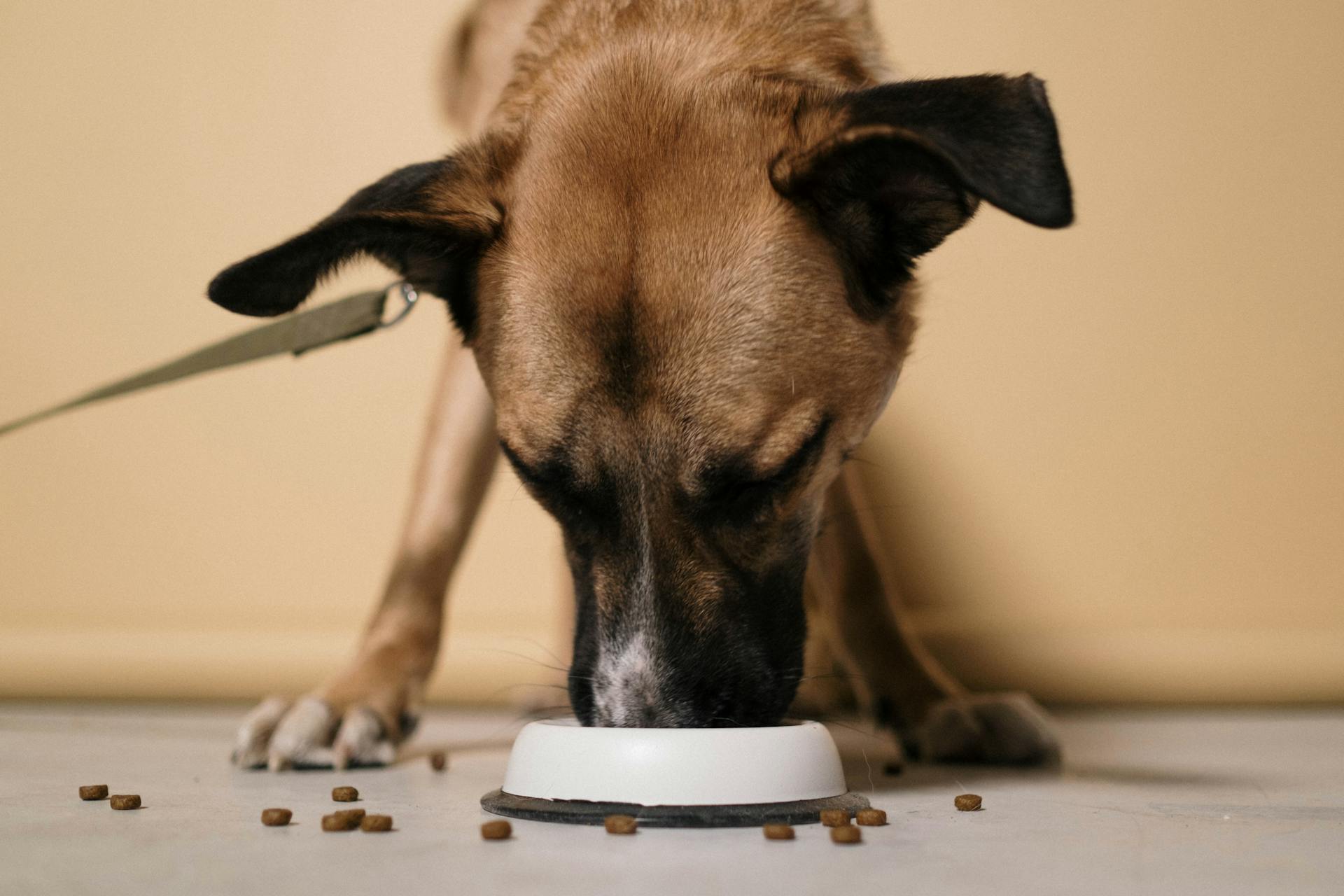
Peanuts and cashews are safe for dogs in small quantities. Just be sure they're not seasoned, flavored, or salted.
Peanut butter is a great treat for your pup, but only in moderation. Look for unsalted peanut butter and avoid sugar-free varieties with Xylitol.
A little bit of peanut butter can go a long way, so start with small amounts to see how your dog reacts.
Xylitol
Xylitol is a natural sugar alcohol commonly used in human food, but it's extremely toxic to dogs. Even small amounts can be lethal.
Peanut butters, syrups, candies, and barbeque sauces often contain xylitol, so it's essential to check the ingredients.
It's not worth the risk, as xylitol can cause severe symptoms in dogs, even in small amounts.
Other Foods to Avoid
When feeding your Chihuahua, it's essential to avoid certain foods that can be toxic or cause harm. Uncooked yeast dough is one such food, as it can expand in their stomach and cause serious health issues.
Raw potato is another food to steer clear of, as it can cause gastrointestinal problems in dogs. I've seen it happen to a friend's dog, and it was a real mess.
Here are some other foods to avoid:
- Seeds and pits from fruit
- Cooked bones
- Apple cores
- Alcohol
- Caffeine
- Human medicine
These foods may seem harmless, but they can lead to serious health issues, including poisoning, choking, and even death. Always stick to a diet approved by your vet, and never share your human food with your Chihuahua.
Stone Fruits Seeds/Pits
Stone Fruits Seeds/Pits are a no-go for your furry friends. Apple seeds, apricot seeds, cherry seeds, and plum seeds all contain cyanide, which can cause a range of problems from vomiting to coma and even death.
These seeds and pits are often overlooked, but they're just as toxic as the other foods we've discussed. It's best to avoid them altogether.
The symptoms of cyanide poisoning can be severe, and it's always better to err on the side of caution when it comes to your dog's health.
Here's a rundown of the stone fruits seeds/pits to watch out for:
Remember, it's always better to be safe than sorry when it comes to your dog's health. Stick to a diet approved by your vet, and keep those stone fruits seeds/pits out of reach.
Tomatoes
Tomatoes are generally okay for dogs in some forms, but not others. A ripened red tomato is usually safe.
Green parts of the tomato plant, however, contain solanine, a toxic substance that's bad news for dogs. Unripe tomatoes also have solanine, so it's best to stick with ripe ones.
Only baking or boiling potatoes with no additives makes them safe in small amounts.
Dogs and Toxic Foods
Dogs should avoid all the foods listed below, including alcohol, avocado, macadamia nuts, grapes and raisins, Xylitol, and chocolate.
Some common signs that your dog may have eaten a toxic food include listlessness, distress, pain, vomiting, or bloody stools.
If your dog eats toxic food, get help as quickly as possible by calling your veterinarian or poison control.
Salt can cause a condition called sodium ion poisoning, not to mention excessive thirst or urination, in dogs.
Symptoms of eating too much salt might include vomiting, diarrhea, high body temperature, and seizures.
The following ingredients are considered toxic to dogs, and depending on the amount can be lethal:
Don't let your dog anywhere near these products, as they are toxic and can lead to potential poisoning, choking, gastrointestinal issues, and death.
General Information
Chihuahuas can be finicky eaters, but it's crucial to stick to a safe and healthy diet. Uncooked yeast dough is toxic to dogs and can cause severe health issues.
Dogs should never be given seeds and pits from fruit, as they can cause choking or obstruction. I've seen it happen to friends' pets, and it's heartbreaking.
Raw potato is another no-go, as it can cause gastrointestinal issues. It's best to avoid sharing your snacks altogether.
Cooked bones are also off-limits, as they can splinter and cause harm. This includes chicken bones, beef bones, and any other type of cooked bone.
Here's a list of foods to avoid:
- Apple cores
- Alcohol
- Caffeine
- Human medicine
These substances can be toxic or cause serious health problems. Always consult with your vet for advice on what to feed your Chihuahua.
Sources
- https://www.petsbest.com/blog/20-foods-dogs-shouldnt-eat
- https://dogtime.com/dog-health/dog-food-dog-nutrition/5504-bad-foods-for-dogs-list
- https://www.petplate.com/blog/diet-nutrition-guide-chihuahuas/
- https://www.hypropremium.com.au/chihuahua-feeding-guide/
- https://rawznaturalpetfood.com/dog-food-ingredients-to-avoid/
Featured Images: pexels.com

